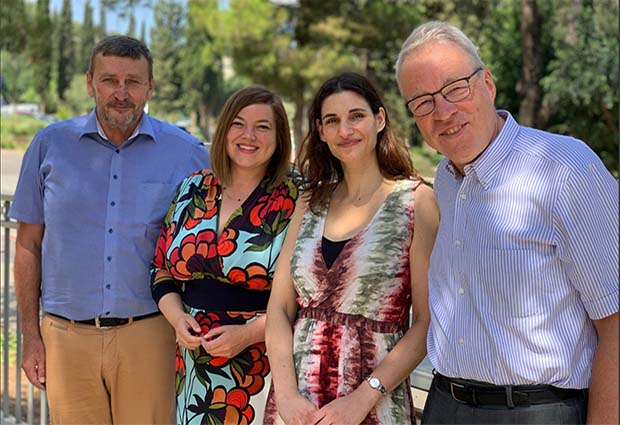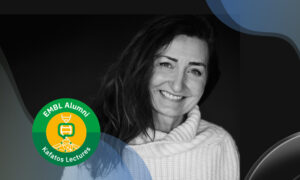
Meytal Landau: a visiting researcher in Hamburg
Strengthening ties between EMBL and member state Israel through the Scientific Visitor Programme

When structural biologist Meytal Landau was considering her options for a one-year sabbatical from her lab at Technion – a scientific research institute in Haifa, Israel – one of her main criteria was to find an institute where she could broaden her knowledge and experience of cryo-electron microscopy. EMBL Hamburg was an obvious contender: Landau would have access to the cutting-edge infrastructure at the Centre for Structural Systems Biology (CSSB), and she already had links with Matthias Wilmanns, Head of EMBL Hamburg, as well as the scientists in charge of the EMBL synchrotron beamlines in Hamburg.
It’s a great fit.
Landau had visited EMBL Hamburg previously to use the synchrotron for her structural work on protein fibrils. “I truly enjoyed my visits to the PETRA III synchrotron at DESY and the EMBL beamlines, especially owing to the outstanding infrastructure and the personnel working at EMBL Hamburg,” she says. “The methodology I wanted to use is available here and is beyond the state of the art. I already had links with EMBL, and knew some of the people here. It’s a great fit.”
With her family in tow, Landau moved to Germany to join the Wilmanns group as a Visiting Researcher, as part of EMBL’s Scientific Visitor Programme. With the support of the administrative team at EMBL Hamburg, she got her visa, tackled the other required paperwork, and found good schools for her two children, all with relative ease. “It was really fast and easy,” she says. “I think I underestimated the challenge of moving to a non-English-speaking country. But the people here have been great, especially Margret Fischer. We couldn’t have done it without her.”
A structural understanding of neurodegenerative diseases
As a postdoc, Landau’s work focused on proteins associated with neurodegenerative diseases – such as Alzheimer’s and Parkinson’s – and their formation of biopolymers called amyloid fibrils. There was emerging evidence that bacteria can make similar polymers, with similar properties, and this fascinated Landau. “These polymers are associated with disease in humans, but they are beneficial to bacteria,” she says. When she started her own lab, she shifted her research focus to investigate protein fibrils in microbes.
Landau is currently exploring protein fibrils in the context of infectious diseases – studying proteins that make bacteria more harmful. She is also investigating the role of these fibrils in causing neurodegenerative diseases, and whether such diseases may be related to the microbiome – the group of bacteria and other microorganisms that inhabit the human body. This work could lead to new applications for antibacterial drugs, with new mechanisms of action, as well as uncovering factors that affect the likelihood of developing neurodegenerative disease. “It’s structural work on protein fibril properties,” Landau says. “I’ve been using X-ray crystallography at the synchrotron here in Hamburg. And now I’m also using electron microscopy, and the great microscopes available here.”
Disseminating science
When Landau returns to her lab in Israel – a founding member state of EMBL – she will take with her the knowledge and scientific experience gained at EMBL Hamburg, as well as a deeper understanding of German culture and people. “The science is great, and also the people,” she says. “I’ve found them open, direct and easy-going.” Matthias Wilmanns also recognises the benefit of hosting scientific visitors such as Landau at EMBL: “Meytal could be a model for disseminating opportunities that exist in our institute to the scientific community in Israel and beyond.”
An ‘EMBL in Israel’ alumni event will take place at The Weizmann Institute of Science in Rehovot, Israel, on 29 November 2020. Meytal will be one of several members of the EMBL community who will speak at the event about research and opportunities at EMBL.
Please save the date – this event is free and open to all.


